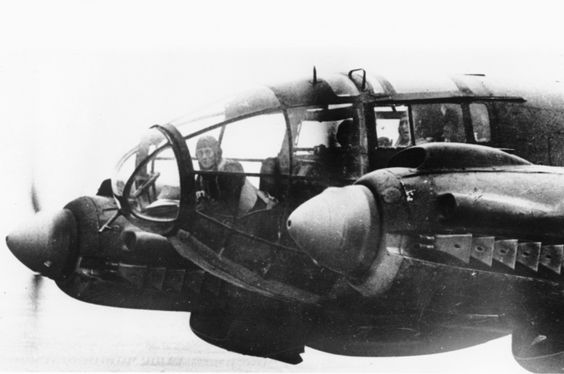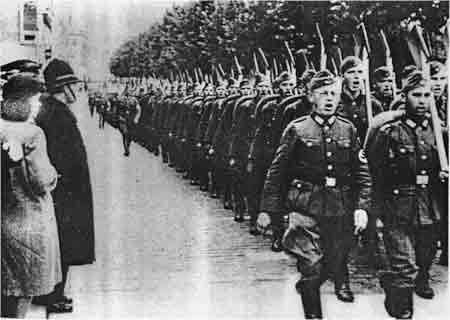Saturday 10 August 1940
 |
| A naval launch from the Widder approaches the Killoran on 10 August 1940. The Killoran will be sunk shortly. |
Battle of Britain: A tentative date for Operation Adlerangriff, or "Eagle Attack," is set for 13 August. The exact start date depends upon the weather forecast. Poor weather prevents a start to the operation today, 10 August 1040, and releases the pilots to do other things, such as go to the movies and out to dinner.
The day is fairly quiet, with few losses by both sides. Luftwaffe raids increasingly are done by solo bombers, and also later in the day and especially at night. The pattern of morning attacks on shipping and evening/night attacks on factories and military objectives such as railways and aircraft factories continues.
The Luftwaffe raids shipping off Swanage and Beachy Head in the morning, then west of Pembroke. The RAF intercepts the attacks and shoots down a Dornier Do 17.
Later in the morning, the Luftwaffe attacks airfields at West Malling, injuring 10 people. RAF No. 501 Squadron chases the bombers but does not make contact.
Around midnight, II,/KG 27 bombers fly over British ports from Bristol to South Wales, dropping bombs and leaflets. The bombs hit the railway viaduct near Swansea, killing four.
The Luftwaffe damages British freighter Blairclova and Haulerwijk about 20 miles northeast of Holyhead in the Irish Sea.
The Luftwaffe sinks 929-ton freighter Varia about 60 miles southeast of Fastnet in the southwest approaches. There are seven deaths.
RAF Bomber Command conducts day raids on airfields along the coast, such as Amsterdam/Schiphol, Caen, Flushing, Querqueville, and Dinard. Night raids target oil installations at Frankfurt and Homburg, supply networks at Soest and Hamm, and the docks at Wilhelmshaven and Hamburg.
Hans-Joachim Marseille joins I. (Jagd) Lehrgeschwader 2 at its airfield at Marck, France.
Battle of the Atlantic: U-56 (Oberleutnant zur See Otto Harms) torpedoes and sinks 16,923-ton British armed merchant cruiser HMS Transylvania north of Ireland a few minutes after midnight. There are 36 deaths (accounts vary) and about 300 survivors. The Royal Navy mounts a massive operation to find the U-boat, but it eludes them. U-56 used its last torpedo on the ship, which takes some time to sink.
German raider Widder is operating south of the Azores when it stops classic Finnish sailing bark Killoran, disembarks the crew, and sinks it with explosives. The 18 men in the crew either are interned or are returned to their home countries depending upon their nationalities. The crew of the Widder is torn about sinking the ship, which really is a strikingly beautiful old clipper ship. However, an officer's duty is a duty.
German raider Orion is operating off Brisbane, Australia and also spots a ship. However, her prey, the troopship Triona, is too fast for her to catch.
British freighter City of Dundee is traveling with Convoy FS 247 when she runs aground off Southend and is lost.
Danish/British 1196 freighter Kirsten hits a mine and sinks off of Denmark.
Dutch 329 ton freighter Albula is sailing in Convoy OA 196 when it collides with US freighter Crescent City and sinks.
A 100-ton British drifter, Young Sid, collides with a collier in the Moray Firth and sinks.
British troopship HMT Neuralia leaves Gibraltar with 2000 evacuees, heading for Madeira, which is neutral.
Convoy FN 248 departs from Southend, Convoy MT 136 departs from Methil, Convoy FS 248 departs from the Tyne.
WS 1 (Winston Special Convoy) has arrived in Bombay with British troops. Convoy BN 3 departs from there with the troops from WS 1 bound for the Suez.
U-94 (Kapitänleutnant Herbert Kuppisch) is commissioned.
British destroyer HMS Holderness (L 48, Lt. Commander Douglas E. Holland-Martin) is commissioned.
Battle of the Mediterranean: It is another quiet day in Malta. The only enemy plane spotted is an Italian flying boat well south of the island, perhaps patrolling for submarines. Malta has experienced an extended period without attacks, so the dockyard is returning to somewhat normal conditions. The RAF on the island conducts photo reconnaissance over the Sciacca and Gela airfields on Sicily.
The government of Malta plans to set up underground chambers as food storehouses to maintain a six-month supply of food. Empty oil tanks also are to be used.
Whitehall makes the difficult but farsighted decision to ship tanks to the Middle East. Prime Minister Churchill authorizes the transfer despite the continuing threat of invasion.
British Somaliland: Italian forces under Lt. General Carlo De Simone continue cautiously closing upon the British positions around Berbera. There is no heavy fighting yet, but De Simone is in the final planning stages. The British put the Scottish 2nd Black Watch into the line.
German/Vichy France Relations: Pierre Laval does his bit to help the German war effort by offering to supply 200 pilots to the Luftwaffe for Channel operations. The pilots have "volunteered." Hermann Goering brushes off the offer and states that the Luftwaffe does not need them.
Anglo/Belgian Relations: The first Free Belgian Brigade - Unite Combattante Belge - is formed in England. It begins with 100 members.
Italian Military: Italian Commando Supremo plans missions against the major British bases at Alexandria and Gibraltar for the autumn.
The Macchi C.202 Folgore (Thunderbolt") prototype MM.445 makes its first flight. It is an advanced "second generation" design by top designer Mario Castoldi and a sign of life in the faltering Regia Aeronautica. The airframe is comparable in quality to that of the Messerschmitt Bf 109, and the addition of a Daimler Benz DB 601Aa engine makes it competitive with any fighter in the world. In retrospect, the Thunderbolt is considered Italy's best and most effective fighter and makes a definite impact on the war in Italy.
German Government: Baldur von Schirach, who has led the Hitler Youth since its inception, is promoted to Gauleiter of Vienna. Artur Axmann replaces von Schirach as the leader of the Hitler Youth.
US Government: US Ambassador to Belgium and Luxembourg John Cudahy has stirred up a hornet's nest the past few days with his observation that civilians in the Low Countries are going hungry due to the British blockade and his prescription that humanitarian aid should be allowed through the British blockade. Today, he is recalled to Washington. He stands by what he has said.
President Roosevelt boards Presidential yacht Potomac and inspects the Portsmouth Navy Yard in New Hampshire and Boston Navy Yard.
Luxembourg: The occupation government makes the odd decision to ban the French language.
Belgium: The occupation government makes listening to the BBC illegal.
Romania: The government passes more laws targeting Jews, such as a ban on marriages between faiths and banned from attending state schools. This is part of the government's continuing effort to ingratiate itself with the German government in Germany.
Syria: Vichy French Syria closes its border to British troops. France retains an army and two airfields in the country. The British are concerned that the French will open Syria and Lebanon up to German forces for an invasion of Palestine and, eventually, Egypt and maybe eventually Iraq.
French Indochina: General Catroux departs for Europe via Singapore.
China: Japan extends its blockade of China to cover all of southern China.
Future History: Bobby Hatfield is born in Beaver Dam, Wisconsin. He goes on to a singing career in the 1960s with the Righteous Brothers and passes away in 2003.
August 1940
August 1, 1940: Two RN Subs Lost
August 2, 1940: Operation Hurry
August 3, 1940: Italians Attack British Somaliland
August 4, 1940: Dueling Legends in the US
August 5, 1940: First Plan for Barbarossa
August 6, 1940: Wipe Out The RAF
August 7, 1940: Burning Oil Plants
August 8, 1940: True Start of Battle of Britain
August 9, 1940: Aufbau Ost
August 10, 1940: Romania Clamps Down On Jews
August 11, 1940: Huge Aerial Losses
August 12, 1940: Attacks on Radar
August 13, 1940: Adler Tag
August 14, 1940: Sir Henry's Mission
August 15, 1940: Luftwaffe's Black Thursday
August 16, 1940: Wolfpack Time
August 17, 1940: Blockade of Britain
August 18, 1940: The Hardest Day
August 19, 1940: Enter The Zero
August 20, 1940: So Much Owed By So Many
August 21, 1940: Anglo Saxon Incident
August 22, 1940: Hellfire Corner
August 23, 1940: Seaplanes Attack
August 24, 1940: Slippery Slope
August 25, 1940: RAF Bombs Berlin
August 26, 1940: Troops Moved for Barbarossa
August 27, 1940: Air Base in Iceland
August 28, 1940: Call Me Meyer
August 29, 1940: Schepke's Big Day
August 30, 1940: RAF's Bad Day
August 31, 1940: Texel Disaster
2020
The day is fairly quiet, with few losses by both sides. Luftwaffe raids increasingly are done by solo bombers, and also later in the day and especially at night. The pattern of morning attacks on shipping and evening/night attacks on factories and military objectives such as railways and aircraft factories continues.
The Luftwaffe raids shipping off Swanage and Beachy Head in the morning, then west of Pembroke. The RAF intercepts the attacks and shoots down a Dornier Do 17.
Later in the morning, the Luftwaffe attacks airfields at West Malling, injuring 10 people. RAF No. 501 Squadron chases the bombers but does not make contact.
Around midnight, II,/KG 27 bombers fly over British ports from Bristol to South Wales, dropping bombs and leaflets. The bombs hit the railway viaduct near Swansea, killing four.
The Luftwaffe damages British freighter Blairclova and Haulerwijk about 20 miles northeast of Holyhead in the Irish Sea.
The Luftwaffe sinks 929-ton freighter Varia about 60 miles southeast of Fastnet in the southwest approaches. There are seven deaths.
RAF Bomber Command conducts day raids on airfields along the coast, such as Amsterdam/Schiphol, Caen, Flushing, Querqueville, and Dinard. Night raids target oil installations at Frankfurt and Homburg, supply networks at Soest and Hamm, and the docks at Wilhelmshaven and Hamburg.
Hans-Joachim Marseille joins I. (Jagd) Lehrgeschwader 2 at its airfield at Marck, France.
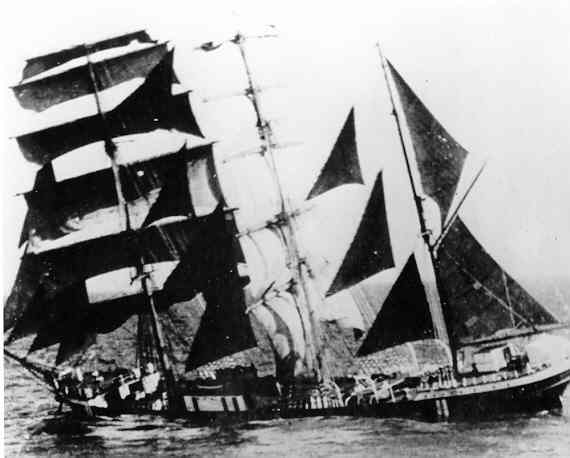 |
| The Killoran heading for the bottom. |
German raider Widder is operating south of the Azores when it stops classic Finnish sailing bark Killoran, disembarks the crew, and sinks it with explosives. The 18 men in the crew either are interned or are returned to their home countries depending upon their nationalities. The crew of the Widder is torn about sinking the ship, which really is a strikingly beautiful old clipper ship. However, an officer's duty is a duty.
German raider Orion is operating off Brisbane, Australia and also spots a ship. However, her prey, the troopship Triona, is too fast for her to catch.
British freighter City of Dundee is traveling with Convoy FS 247 when she runs aground off Southend and is lost.
Danish/British 1196 freighter Kirsten hits a mine and sinks off of Denmark.
Dutch 329 ton freighter Albula is sailing in Convoy OA 196 when it collides with US freighter Crescent City and sinks.
A 100-ton British drifter, Young Sid, collides with a collier in the Moray Firth and sinks.
British troopship HMT Neuralia leaves Gibraltar with 2000 evacuees, heading for Madeira, which is neutral.
Convoy FN 248 departs from Southend, Convoy MT 136 departs from Methil, Convoy FS 248 departs from the Tyne.
WS 1 (Winston Special Convoy) has arrived in Bombay with British troops. Convoy BN 3 departs from there with the troops from WS 1 bound for the Suez.
U-94 (Kapitänleutnant Herbert Kuppisch) is commissioned.
British destroyer HMS Holderness (L 48, Lt. Commander Douglas E. Holland-Martin) is commissioned.
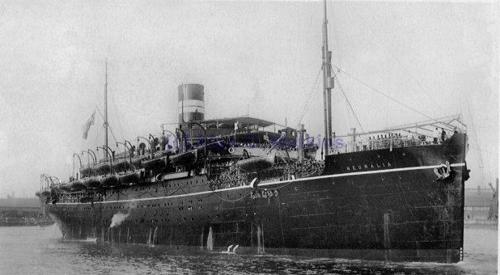 |
| The HMT Neuralia leaves Gibraltar on 10 August 1940. |
The government of Malta plans to set up underground chambers as food storehouses to maintain a six-month supply of food. Empty oil tanks also are to be used.
Whitehall makes the difficult but farsighted decision to ship tanks to the Middle East. Prime Minister Churchill authorizes the transfer despite the continuing threat of invasion.
British Somaliland: Italian forces under Lt. General Carlo De Simone continue cautiously closing upon the British positions around Berbera. There is no heavy fighting yet, but De Simone is in the final planning stages. The British put the Scottish 2nd Black Watch into the line.
German/Vichy France Relations: Pierre Laval does his bit to help the German war effort by offering to supply 200 pilots to the Luftwaffe for Channel operations. The pilots have "volunteered." Hermann Goering brushes off the offer and states that the Luftwaffe does not need them.
Anglo/Belgian Relations: The first Free Belgian Brigade - Unite Combattante Belge - is formed in England. It begins with 100 members.
Italian Military: Italian Commando Supremo plans missions against the major British bases at Alexandria and Gibraltar for the autumn.
The Macchi C.202 Folgore (Thunderbolt") prototype MM.445 makes its first flight. It is an advanced "second generation" design by top designer Mario Castoldi and a sign of life in the faltering Regia Aeronautica. The airframe is comparable in quality to that of the Messerschmitt Bf 109, and the addition of a Daimler Benz DB 601Aa engine makes it competitive with any fighter in the world. In retrospect, the Thunderbolt is considered Italy's best and most effective fighter and makes a definite impact on the war in Italy.
German Government: Baldur von Schirach, who has led the Hitler Youth since its inception, is promoted to Gauleiter of Vienna. Artur Axmann replaces von Schirach as the leader of the Hitler Youth.
 |
| The Killoran's final plunge on 10 August 1940. |
President Roosevelt boards Presidential yacht Potomac and inspects the Portsmouth Navy Yard in New Hampshire and Boston Navy Yard.
Luxembourg: The occupation government makes the odd decision to ban the French language.
Belgium: The occupation government makes listening to the BBC illegal.
Romania: The government passes more laws targeting Jews, such as a ban on marriages between faiths and banned from attending state schools. This is part of the government's continuing effort to ingratiate itself with the German government in Germany.
Syria: Vichy French Syria closes its border to British troops. France retains an army and two airfields in the country. The British are concerned that the French will open Syria and Lebanon up to German forces for an invasion of Palestine and, eventually, Egypt and maybe eventually Iraq.
French Indochina: General Catroux departs for Europe via Singapore.
China: Japan extends its blockade of China to cover all of southern China.
Future History: Bobby Hatfield is born in Beaver Dam, Wisconsin. He goes on to a singing career in the 1960s with the Righteous Brothers and passes away in 2003.
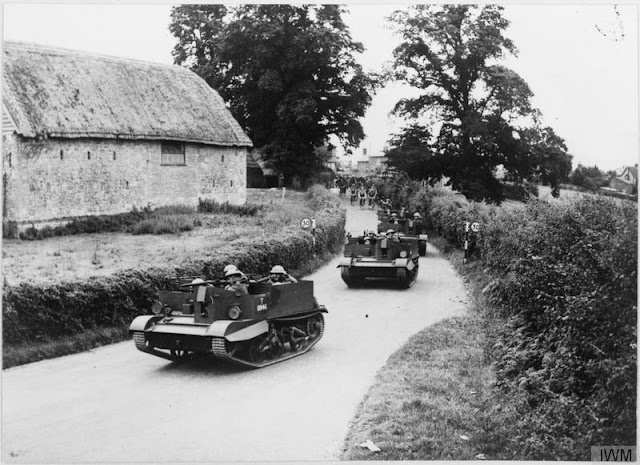 |
| Universal carriers and cyclists of 6th Battalion, The Black Watch, passing through Haven Street on the Isle of Wight, 10 August 1940. |
August 1940
August 1, 1940: Two RN Subs Lost
August 2, 1940: Operation Hurry
August 3, 1940: Italians Attack British Somaliland
August 4, 1940: Dueling Legends in the US
August 5, 1940: First Plan for Barbarossa
August 6, 1940: Wipe Out The RAF
August 7, 1940: Burning Oil Plants
August 8, 1940: True Start of Battle of Britain
August 9, 1940: Aufbau Ost
August 10, 1940: Romania Clamps Down On Jews
August 11, 1940: Huge Aerial Losses
August 12, 1940: Attacks on Radar
August 13, 1940: Adler Tag
August 14, 1940: Sir Henry's Mission
August 15, 1940: Luftwaffe's Black Thursday
August 16, 1940: Wolfpack Time
August 17, 1940: Blockade of Britain
August 18, 1940: The Hardest Day
August 19, 1940: Enter The Zero
August 20, 1940: So Much Owed By So Many
August 21, 1940: Anglo Saxon Incident
August 22, 1940: Hellfire Corner
August 23, 1940: Seaplanes Attack
August 24, 1940: Slippery Slope
August 25, 1940: RAF Bombs Berlin
August 26, 1940: Troops Moved for Barbarossa
August 27, 1940: Air Base in Iceland
August 28, 1940: Call Me Meyer
August 29, 1940: Schepke's Big Day
August 30, 1940: RAF's Bad Day
August 31, 1940: Texel Disaster
2020


